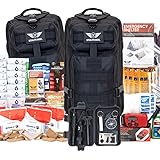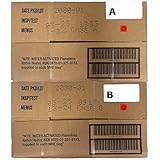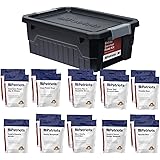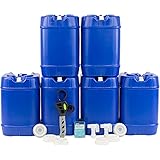Creating an emergency reference library is one of the best moves I’ve ever made. We all know life can throw us some unexpected challenges, and being prepared is super important. So, here’s my guide to establishing an emergency reference library that will help you navigate those rough patches like a pro. Let’s dive into the five key areas to consider!
Essential Survival Skills
Understanding Basic First Aid
First aid is a crucial part of any emergency plan. I’ve had my fair share of scrapes and bumps, and knowing how to handle them can make all the difference. Start with a solid first aid manual that covers everything from cuts to sprains. A good manual will not only teach you basic skills, but it’ll also give you a sense of confidence when tackling minor emergencies.
In addition to reading, I highly recommend practicing these skills. Gather your friends or family and set up mock scenarios. You’d be amazed how much you can learn by doing! Plus, it’s a great team-building exercise.
Lastly, consider taking a first aid certification course if you can. It’s not only a valuable learning experience, but it also adds a layer of credibility to your knowledge. Trust me, the more prepared you feel, the more capable you will be when a real emergency hits.
Navigation Skills
Map reading and navigation may seem old-fashioned, but let me tell you — they’re still vital. In a world of smartphones, we often forget that technology can fail. I’ve found that keeping a good ol’ paper map handy can be a lifesaver.
Spend some time studying how to use a compass alongside your map. It’s like a workout for your brain and prepares you for when GPS doesn’t come through. Pairing these two skills with some local knowledge about your area can turn you into a navigation ninja!
Remember, practice makes perfect! Take trips where you consciously choose not to use your phone for navigation. You’ll surprise yourself with how quickly you adapt back to old-school methods.
Fire Starting Techniques
One of the most comforting skills to have is the ability to start a fire. I can’t emphasize enough how helpful it can be in an emergency, whether for warmth, cooking, or signaling for help. I started by acquiring a basic fire starter kit, which should include materials like tinder and kindling. The easier you make it for yourself, the faster you’ll learn.
== > What if ... Get a FREE Subscription to PREPARE
Next, get outside and practice! Choose different environments and conditions to see how fire behaves in each scenario. Understanding how weather influences flame and which materials work best is key to mastering this skill.
Lastly, don’t forget safety. Always ensure you have a safe area set up to practice your fire-starting techniques. Being able to make a fire is one thing, but doing it safely is a whole different ball game.
Emergency Preparedness Plans
Creating a Family Emergency Plan
Creating a solid family emergency plan is vital. Get the whole gang together and brainstorm what could happen in different scenarios, like natural disasters or medical emergencies. It’s actually kind of fun to imagine these things—don’t knock it ‘til you try it! But really, having all family members involved spreads awareness about potential risks.
Assign everyone roles in the plan. You’ll feel a lot better knowing who’s in charge of what — whether it’s grabbing the first aid kit or securing the pets. It’s also wise to practice this plan regularly. Run through it at least once a year, so everyone knows what to do when the time comes.
Lastly, keep your plan written down and accessible. Whether it’s a family calendar hanging on the fridge or a shared document online, make sure everyone knows where to find it. During a crisis, the last thing you want to be doing is scrambling for your plan!
Stockpiling Supplies
Having a stash of supplies is like having a safety net. Start with the basics: food, water, and medicine. I always recommend non-perishable food items that are easy to prepare. Think canned goods, rice, and granola bars — it’s all about keeping it simple.
Water is another crucial element. Remember to store enough for everyone in your household. A general rule of thumb is at least one gallon per person per day for about three days. Don’t forget to check and rotate these stockpiles periodically, so nothing goes to waste!
Finally, consider other supplies like flashlights, batteries, and hygiene products. It’s really about thinking ahead to what you might need during an emergency. Having those essentials handy gives you peace of mind, and that’s priceless!
Communication Strategies
Effective communication during a crisis is paramount. Make sure everyone in your family knows where to meet if you get separated. Choose a central location that’s easy to find and remember. In our family, we call it our “home base,” and it has literally saved us during minor emergencies.
Get Preparedness and Self-Reliance Tips. Subscribe Now!
Utilize group messaging apps to keep everyone updated. It’s an easy way to stay connected, whether you’re in the same town or spread out across the country. I find it’s helpful to create a back-up plan for when the technology fails us — like a designated person everyone checks in with.
Lastly, remember to practice staying calm during a crisis. Emotions can run high when excitement kicks in, but breathing and remaining clear-headed can make all the difference in effective communication.
Resources for Further Learning
Books and Manuals
Books are my go-to for diving deeper into emergency preparedness. There are some fantastic manuals out there that cover a broad range of topics, from wilderness survival to disaster response tactics. I love getting a few different perspectives, as each author has unique insights to offer.
Make sure to choose books that are easy to read and comprehend, especially in high-stress situations. It’s no good to have a brain freeze when you’re trying to remember how to bandage a wound or start a fire!
And don’t forget to note down any key takeaways or tips before you hit the road. Having a concise reference will save you loads of time when you’re in a pinch!
Online Courses and Webinars
Online platforms offer great courses related to emergency preparedness. I’ve taken several workshops on everything from first aid to survival cooking, and they’ve all been super useful. The best part is you can often do them at your own pace, which makes it easy to fit into a busy schedule.
Many of these courses feature interactive elements, where you can engage with instructors and get feedback on your skills. It’s a great way to supplement your learning and truly understand the material.
Also, don’t underestimate the power of community. Join online forums or local groups to share knowledge, ask questions, and find additional resources. It’s all about learning from each other, right?
Local Workshops and Meetups
Never underestimate the value of local workshops. They often combine hands-on practice with personal experience, and that’s where the magic happens. While I can read all day long, nothing beats learning from someone who’s been there and done that.
These workshops are also a wonderful opportunity to meet like-minded individuals, forming connections and potential support networks when emergencies arise. Plus, who knows — you might find a mentor or buddy to practice with afterward!
In summary, don’t just rely on online resources. Get out there, meet people, and learn from real-life interactions. It adds a personal touch that books and websites can’t match.
FAQ
What should I prioritize when starting my emergency reference library?
Start with essential skills, like first aid and navigation, then build your library around practical resources that cover emergency preparedness and survival techniques.
How often should I review and update my emergency plan?
Review your emergency plan at least once a year, and update it whenever there are changes in your household or new information becomes available.
Are there specific books you recommend for survival skills?
Some great picks include “The SAS Survival Handbook” and “Emergency: This Book Will Save Your Life” by Neil Strauss. They’re packed with practical tips and information.
What supplies should I include in my emergency kit?
Your emergency kit should include water, non-perishable food, first aid supplies, flashlights, batteries, and hygiene products. Tailor it to your needs and make sure it’s easily accessible.
How can I get my family involved in emergency preparedness?
Involve your family by hosting brainstorming sessions to discuss potential emergencies, assigning roles in your emergency plan, and practicing your steps together regularly.
Get Preparedness and Self-Reliance Tips. Subscribe Now!
Related Content
Stealth Angel Survival - 72 Hour Family Emergency Kit - 1-5 Person Survival Bag for Earthquakes, Hurricanes, and Other Natural Disasters
Now retrieving the price.
(as of March 4, 2026 13:14 GMT -05:00 - More infoProduct prices and availability are accurate as of the date/time indicated and are subject to change. Any price and availability information displayed on [relevant Amazon Site(s), as applicable] at the time of purchase will apply to the purchase of this product.)Meals Ready to Eat A and B bundle cases 2025, 2026 inspection. Genuine Military US surplus emergency food bulk supply full box with heater
$84.95 (as of March 4, 2026 13:14 GMT -05:00 - More infoProduct prices and availability are accurate as of the date/time indicated and are subject to change. Any price and availability information displayed on [relevant Amazon Site(s), as applicable] at the time of purchase will apply to the purchase of this product.)4Patriots Emergency Entree Food Kit – 128 Tasty Freeze-Dried MRE Survival Meals, 25 Year Shelf Life
$125.95 (as of March 4, 2026 13:14 GMT -05:00 - More infoProduct prices and availability are accurate as of the date/time indicated and are subject to change. Any price and availability information displayed on [relevant Amazon Site(s), as applicable] at the time of purchase will apply to the purchase of this product.)Country Fresh Instant Nonfat Dry Milk Powder, 39 Servings, 20 Year Shelf Life, Gluten Free - Canned Vitamin-Fortified Nonfat Milk Powder for Baking and Emergency Food Supplies
$13.00 (as of March 4, 2026 13:14 GMT -05:00 - More infoProduct prices and availability are accurate as of the date/time indicated and are subject to change. Any price and availability information displayed on [relevant Amazon Site(s), as applicable] at the time of purchase will apply to the purchase of this product.)Legacy Food Storage Emergency Water Storage Containers, Long Term 5 Gallon Water Tank - 6 Stackable Food Grade Tanks Included, for Camping, Prepping, Survival - 30 Gallon Total Capacity
Now retrieving the price.
(as of March 4, 2026 13:14 GMT -05:00 - More infoProduct prices and availability are accurate as of the date/time indicated and are subject to change. Any price and availability information displayed on [relevant Amazon Site(s), as applicable] at the time of purchase will apply to the purchase of this product.)





